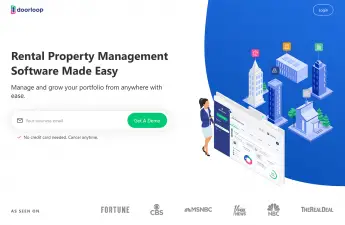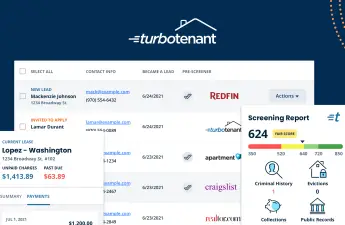In the dynamic landscape of property management, landlords are increasingly recognizing the need to operate with the precision and expertise of seasoned business professionals. After all, rental properties are not just investments; they are thriving businesses that demand meticulous attention to detail. In this digital age, where convenience meets innovation, one essential tool stands out: the virtual bank account.
In this comprehensive guide, you’ll understand how virtual bank accounts work and how they can revolutionize the way you manage your rental properties. We’ll also delve into the advantages of virtual debit cards and answer a few frequently asked questions.
What Is a Virtual Bank Account?
A virtual bank account is a financial tool that operates in tandem with traditional, physical bank accounts, often referred to as “settlement accounts.” These virtual accounts are not standalone bank accounts but are associated with and linked to their corresponding physical accounts.
Here are some key features of virtual bank accounts:
- Unique Account Numbers: Each virtual bank account is assigned a unique account number, distinct from the account number of the underlying settlement account.
- Transaction Handling: Virtual bank accounts can send and receive funds on behalf of the associated settlement account.
How Does a Virtual Bank Account Work?
Virtual bank accounts function like standard bank accounts but offer unique advantages tailored to the needs of businesses and landlords. Here’s a breakdown of how they work:
1. Account Structure
A virtual bank account is structured with its own account number and associated details, just like a traditional bank account. This distinct account number allows for easy differentiation and tracking of funds, simplifying financial management.
2. Transaction Management
Much like regular accounts, virtual bank accounts facilitate incoming and outgoing transactions. Users can receive payments, make payments, and maintain their account balances with ease. These transactions are executed within the virtual account environment.
3. Payment Collection
When a virtual bank account is used to receive money, it collects the necessary information about the sender, such as their name and the purpose of the transaction. This information is then passed over to the primary account associated with the virtual account.
What are the Benefits of Having a Virtual Bank Account?
Today, landlords are increasingly recognizing the immense value of virtual bank accounts and virtual debit cards in optimizing their financial operations. Let’s explore some of the compelling benefits associated with these modern banking tools:
1. Streamlined Financial Organization
Virtual bank accounts offer a systematic approach to financial management. For example, with Baselane, landlords can open one primary account and create multiple virtual sub-accounts, each serving a specific purpose. This structure simplifies the organization of funds and ensures that income, expenses, and reserves are neatly separated for easy tracking.
Examples of sub-accounts include:
- Main Account: Used for rent collection, mortgage payments, and other regular transactions.
- Maintenance Reserve Account: Allows landlords to allocate a percentage of income (e.g., 5%) for future maintenance and unexpected expenses, ensuring financial preparedness for a rainy day.
- Security Deposit Account: Safely holds tenant security deposits separately, meeting legal requirements and simplifying refund processes.
![]() Also Read: Baselane Overview: Landlord Banking & Rental Property Finances
Also Read: Baselane Overview: Landlord Banking & Rental Property Finances
2. Efficient Financial Management
With virtual bank accounts, landlords can efficiently manage their rental property finances, reducing the complexity of income and expense tracking. This efficiency leads to more accurate accounting, making tax season less stressful.
3. Enhanced Security
Virtual bank accounts provide an added layer of security, especially when dealing with tenant security deposits. Funds are kept separate and easily accessible, ensuring compliance with legal requirements and simplifying refund processes.
What Is the Difference Between a Virtual Bank Account and a Traditional Bank Account?
Virtual bank accounts and traditional bank accounts may share some similarities, but they also have distinct differences that cater to specific financial needs. Let’s explore these differences:
Fund Holding Capability
One of the fundamental differences lies in the ability to hold money. Traditional bank accounts are capable of holding and managing actual funds. In contrast, virtual bank accounts can’t hold money themselves. Instead, they act as intermediaries or placeholders for funds, directing them to the appropriate destination.
Automation of Reconciliation
Virtual bank accounts excel in automating the reconciliation process, a task often time-consuming and prone to human error when using traditional accounts. With virtual accounts, transactions are seamlessly categorized and routed to the corresponding primary account. This automation reduces manual effort, minimizes the risk of errors, and ensures precise accounting.

What Is a Virtual Debit Card?
A virtual debit card operates on the same principles as a traditional debit card, with one notable distinction: it doesn’t exist in physical form. Instead, it is a digital representation of a debit card that enables online transactions and payments. Here’s a closer look at the characteristics and functionality of virtual debit cards:
- Digital Counterpart: A virtual debit card serves as the digital counterpart of a physical debit card issued by a traditional bank. It carries the essential card details, such as the card number, expiration date, and security code (CVV), required for online purchases.
- Online Transactions: Just like a physical debit card, a virtual debit card can be used to make online purchases and payments. It offers a secure and convenient means of conducting transactions in the digital realm.
- Enhanced Security: Virtual debit cards often provide enhanced security features. They can be generated for a single-use, specific merchant, or a limited spending amount, adding an extra layer of protection against fraud and unauthorized transactions.
- Privacy and Control: Virtual debit cards empower users with greater control over their financial transactions. They can be easily created, managed, and even revoked, offering increased privacy and reducing the risk of recurring charges from subscriptions or services.
Virtual Bank Accounts: Frequently Asked Questions
Absolutely. Landlords can benefit immensely from virtual bank accounts and virtual debit cards. These modern tools help streamline financial organization, enhance security, and simplify property management.
Baselane offers a dedicated landlord account tailored to the unique needs of property owners. Opening a Baselane banking account for landlords is a quick process. After creating a free account, you can choose to open an individual or business account. Provide the necessary personal or business details, submit your application, and await notification after review.
Opening a virtual bank account is a straightforward process that usually involves completing an online form and providing identity verification through local ID scans or photos. Some virtual banks also incorporate biometric authentication like fingerprint scans or facial recognition.
Once your account is approved, which typically takes just minutes, you’ll receive a virtual international bank account number (vIBAN). This enables you to manage funds across virtual and physical accounts, make international transfers, allocate funds to savings, and even apply for credits and loans.
Yes, virtual bank accounts can be secure, provided the bank adheres to jurisdiction regulations and employs robust security measures. These safety measures include encryption, alert systems, advanced authentication methods, and secure email protocols to protect your finances and personal information.
Many virtual banking companies offer the option to get a virtual debit card, although this process may require a separate application. Virtual debit cards provide convenient and secure access to your funds for online transactions. Make sure to inquire with your chosen virtual bank about the availability and process for obtaining a virtual debit card.
Virtual Bank Accounts: Landlord Gurus Takeaway
A virtual bank account is an excellent choice for landlords seeking to enhance their financial management. It offers the means to better organize banking activities, providing efficient tools to streamline transactions, segregate funds, and simplify property management. Embracing virtual banking is a smart step towards optimizing your financial approach in the world of property ownership.
Disclosure: Some of the links in this post are affiliate links and Landlord Gurus may earn a commission. Our mission remains to provide valuable resources and information that helps landlords manage their rental properties efficiently and profitably. We link to these companies and their products because of their quality, not because of the commission.




